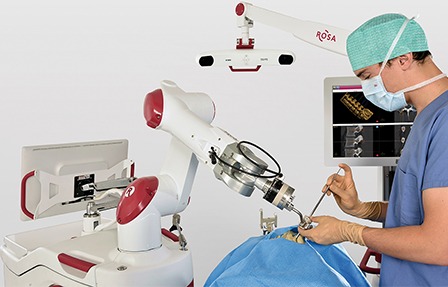
Zimmer Biomet has issued a voluntary field action notice to users of some of its Rosa Spine, Rosa One and Rosa Brain models. Citing a software problem, the notice promises that a software update will be delivered on-site by Medtech representatives from August 2017.
A subsidiary of Zimmer Biomet acquired 58.77% of Medtech—the manufacturers of the Rosa surgical robots—last year, shortly after announcing the acquisition of LDR. A number of Medtech board members were replaced with Zimmer Biomet employees as part of this purchase.
“The situation can occur when the robot arm is automatically sent to trajectory. More specifically, when the robot arm is automatically sent onto a trajectory, Cartesian coordinates are converted to joint configuration through a mathematical model and, for a very limited number of positions, the mathematical model is imperfect and may prevent the robot arm from reaching the desired position,” the field action notice reads. For non-isocentric moves, an error message will be displayed and the machine will shut down when “sent to an unreachable trajectory”. Using isocentric micromoves during brain surgery, however, can lead to a “hazardous situation” if “an automatic micro movement to trajectory is planned on the robot and an instrument is inside the patient anatomy.” Left undetected, such movements could lead to serious injury, or even death.
The software fault was discovered internally, the notice states, and has not been reported by any users.
Until the software update occurs, the notice mandates that users cease use of the isocentric micromovement function during brain surgery with the Rosa Brain 3.0 and Rosa One systems.
Other automatic movement errors with other systems may be dealt with, for example, by resetting the device, the notice states.












